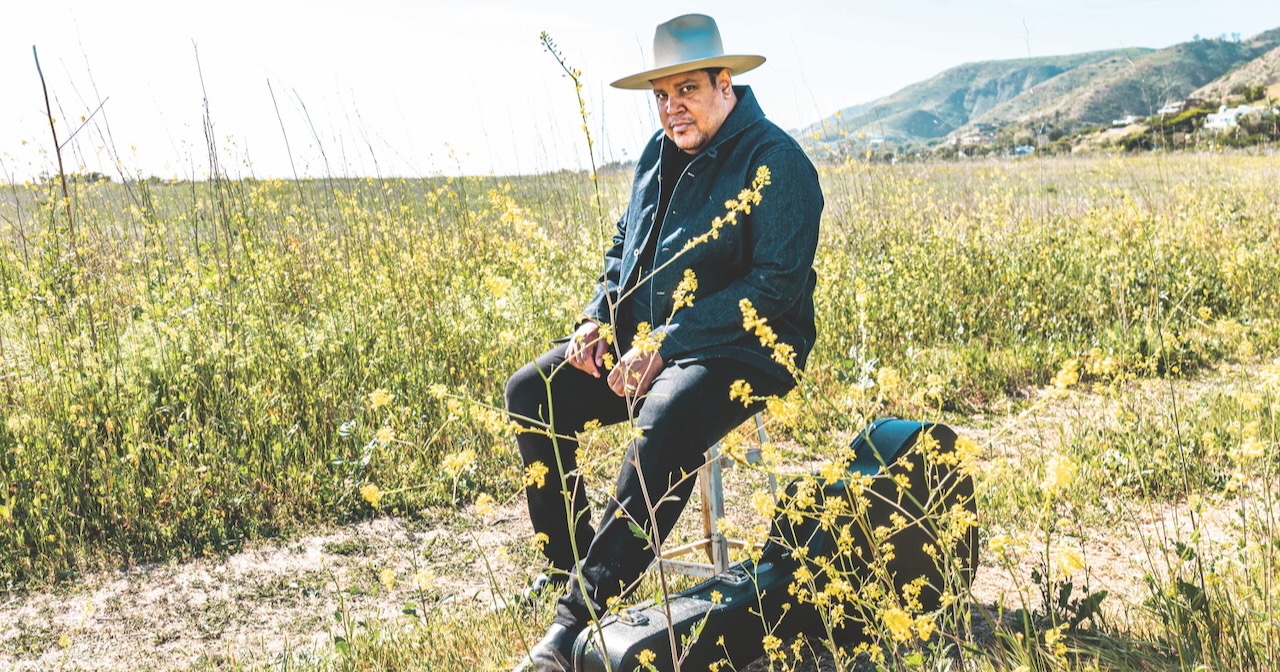Hello Folks! My name is Chris Pierce. I’m a musician, songwriter and storyteller. My new album, Let All Who Will, was created to offer a message of resilience and empowerment – and to remind those who have been pressed to never give up the good fight for justice and equality. The songs are there for folks to hear, dissect and discuss. They also offer suggestions of ways to speak up and move together from a place of common ground. I believe that compassion is the only way forward. I fight with compassion. I sing with compassion. For this Mixtape, let’s explore a theme of the healing powers of music. Songs of liberation, pain, encouragement, empowerment and togetherness. – Chris Pierce
Reverend Gary Davis – “Let Us Get Together Right Down Here”
Starting with a song from Rev. Gary Davis – also known as Blind Gary Davis (born on April 30, 1896) – a blues and gospel singer who was also proficient on the banjo, guitar, and harmonica. Born in Laurens, South Carolina, and blind since infancy, Davis first performed professionally in the Piedmont blues scene of Durham, North Carolina, in the 1930s. After relocating to New York in the 1940s, Davis experienced a career rebirth as part of the American folk music revival that peaked through the 1960s. I’ve always been particularly moved by this song by Rev. Davis as it draws the listener in right away and encourages us all to “get together” as part of the great congregation of humanity.
Nina Simone – “Backlash Blues”
Growing up, my mother was an English teacher and I was fortunate enough to have access to books by some of the greatest writers of our time. I gravitated towards studying Langston Hughes from the time I was around 10 years old and the inspiration from reading his profound works is one of the reasons that I became a songwriter. “Backlash Blues” is one of his poems that was given a melody and was sung by the high priestess of soul, Nina Simone. It was written as a sign of hope for Black people during times of segregation.
Chris Pierce – “It’s Been Burning for a While”
This song is a response to the furor surrounding the tragic death of George Floyd in 2020. It was beyond puzzling to see how surprised many voices were, in the media and beyond, at the anger people felt. My co-writer and I collaborated on this song in an effort to point out that while all these stories have been making the headlines a lot recently, repression of the marginalized is nothing new.
Richie Havens – “Handsome Johnny”
Richie Havens’ music has elements of folk, soul and rhythm and blues. He had an intense and rhythmic guitar style and often played in open tunings. A lot of folks know him from Woodstock, but he continued on playing concerts right up until his passing in 2013.
I’ve been deeply inspired by Richie Havens in my own songwriting and growing up hearing songs like “Handsome Johnny” inspired me to expand my writing. To me, “Handsome Johnny” testifies about the sacrifices and inner struggles of the soldier and describes soldiers of all kinds going off to fight for what they believe in.
Lead Belly – “In the Pines” / “Black Girl” / “Where Did You Sleep Last Night?”
I’ve studied Lead Belly’s songs throughout my journey as a songwriter. His songs covered a wide range of genres and topics including gospel music; love, loss, liquor, prison life and racism; and folk songs about cowboys, prison, work, sailors, cattle herding and dancing. His version of “In The Pines” is one of the most widely known.
“In the Pines” is an American folk song originating from two songs, “In the Pines” and “The Longest Train,” both of whose authorship is unknown and date back to at least the 1870s. The songs originated in the Southern Appalachian area of the United States. Historians have said this song was probably born from African Americans living along or east of the Appalachian Mountains around the turn of the 20th century. Huddie Ledbetter, better known as Lead Belly, recorded over half-a-dozen versions between 1944 and 1948, most often under the title “Black Girl” or “Black Gal.” His first rendition, recorded for Musicraft Records in New York City in February 1944, is arguably his most familiar.
Odetta – “Got My Mind on Freedom”
Odetta Holmes, known as Odetta, is an inspiration to all. Born in Birmingham, Alabama on December 31, 1930, her voice has inspired hearts all over the world and she is often referred to as “The Voice of the Civil Rights Movement.” Odetta truly embodied a voice that inspired change. Martin Luther King Jr. called her the queen of American folk music.
Terry Callier – “Spin, Spin, Spin”
Terry Callier was born in the North Side of Chicago. He was a childhood friend of Curtis Mayfield, Major Lance and Jerry Butler and he sang in doo-wop groups in his teens. In 1964 he recorded his debut album on Prestige Records. The album wasn’t released until 1968 as The New Folk Sound of Terry Callier. A dear musician friend of mine gifted me a copy of the album around 20 years ago and it’s been in steady rotation in my house ever since. My opinion, widely shared, is that Terry Callier didn’t get the popular recognition his varied talents deserved. Nonetheless, he released a string of enduring and influential albums.
Josh White – “Southern Exposure”
When I was in the 6th grade, I wrote a book report on the music of Josh White. I remember heading to the library in Claremont, California, and finding a treasure chest of literature and recordings by White. I dove in and was deeply inspired by the man, the songwriter, guitarist and civil rights activist that he was. White grew up in the South during the 1920s and 1930s. He released a prolific output of recordings in genres including Piedmont blues, country blues, gospel music and social protest songs. His music went on to influence several generations of artists, including yours truly. White’s album, Southern Exposure, is known as a political blues album and dealt with issues of Jim Crow. The album as a whole, to me, is a protest album of protest albums.
Bob Dylan – “Only a Pawn in Their Game”
Bob Dylan sang a stirring solo performance of “Only a Pawn In Their Game,” at The March on Washington, a retelling of the murder of civil rights activist Medgar Evers. The lyrics attribute blame for the killing and other racial violence to the rich white politicians and authorities who manipulated poor whites into directing their anger and hatred at Black people. The song suggests that Evers’ killer does not deserve to be remembered by name, unlike the man he murdered (“They lowered him down as a king”), because he was “only a pawn in their game.”
Chris Pierce – “Mr. McMartin”
My song, “Mr. McMartin” from my new album, Let All Who Will, is about a street sweeper who has seen a lot of what human beings are capable of in the past 40 years on the job. He sweeps after celebrations, uprisings, political rallies, parades, holidays and catastrophes. As he sweeps on through the years, he wonders if we are capable of real change or just broken promises and broken prayer.
Photo Credit: Mathieu Bitton

